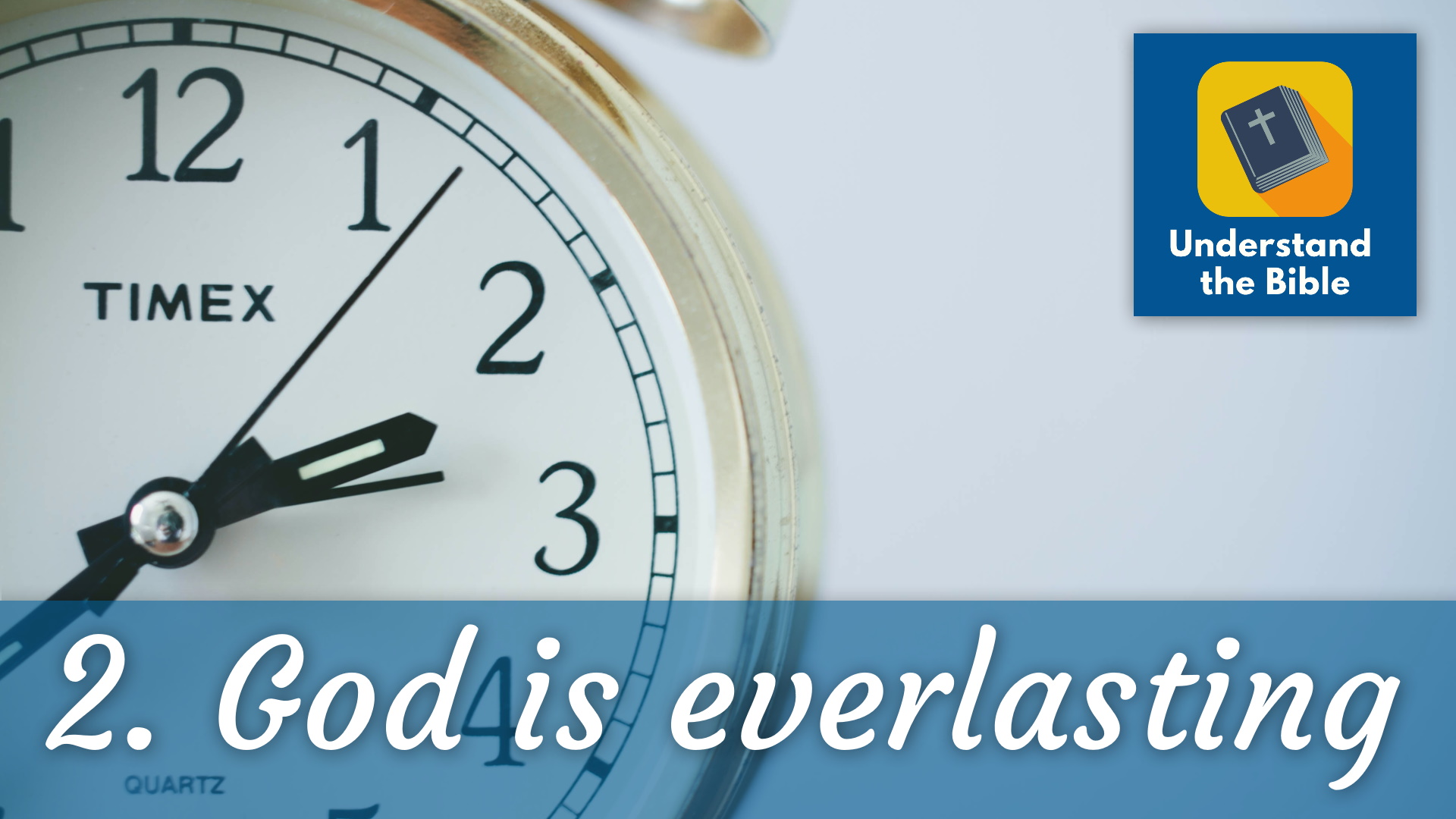In the second part of our “Get to know God” series, we’re going to think about how God is everlasting or eternal. The Bible teaches that God has always existed, and will always exist. He doesn’t have a beginning or an end. He is not bound by time in the way that we human beings are. Let’s think about what the Bible has to say about God’s eternity, and then think about how it makes a difference in our lives.
What does the Bible say about God’s eternity?
God never had a beginning
Before the mountains were born
Psalm 90:2
or you brought forth the whole world,
from everlasting to everlasting you are God.
One of the most important things to grasp about God is that he never had a beginning. He has always existed. I know that’s hard to get your head around! We human beings are so used to thinking of things in terms of beginning and ending, that it’s very difficult – if not impossible – to really understand how God could be different. But – that is what the Bible teaches.
This is fundamental to who God is. The universe needs to have a “first cause”. In Stephen Hawking’s famous book A Brief History of Time, he tells this story:

A well-known scientist (some say it was Bertrand Russell) once gave a public lecture on astronomy. He described how the earth orbits around the sun and how the sun, in turn, orbits around the centre of a vast collection of stars called our galaxy. At the end of the lecture, a little old lady at the back of the room got up and said: “What you have told us is rubbish. The world is really a flat plate supported on the back of a giant tortoise.” The scientist gave a superior smile before replying, “What is the tortoise standing on?” “You’re very clever, young man, very clever,” said the old lady. “But it’s turtles all the way down!”
If you think about it for a moment, there has to come something at the bottom of the pile. It’s the same thing with creation. If you ask, ‘who created God?’ then you have to ask ‘Who created the person who created God?’ and so on.
Someone or something had to come first.
God made everything
The very first verse in the Bible, Genesis 1:1, says: “In the beginning God created the heavens and the earth.” Psalm 90 says that God was God even before anything had been created. The Bible says that God himself is the ‘first cause’ of everything in the universe. As John 1 says of Jesus: “Through him all things were made; without him nothing was made that has been made” (John 1:3).
What is interesting is that this is attested by science: the Big Bang Theory states that the universe had a beginning, a moment when everything began to exist. According to science, there was a time when our universe came into existence. Scientists, of course, cannot answer the question of why the universe came into existence. Nothing cannot create nothing.
It seems to me the only logical explanation is to say that there was a personal being who created the universe. It’s interesting how science and Christianity have often been portrayed as enemies, when actually they go together well.
God does not change

Hebrews 13:8 says, “Jesus Christ is the same yesterday and today and for ever”. Although years come and go (for us), God stays the same. We can be sure that the God we pray to when we’re 7 is the same God that we pray to when we’re 77. His love is the same. We may change, but God does not. We’ll return to this theme over the coming sessions as it’s something which other areas touch upon. But, for now, let’s just leave it at the fact that God does not change.
What difference does God’s eternity make to us?
1. It helps us to trust in God
Trust in the Lord for ever, for the Lord, the Lord himself, is the Rock eternal.
Isaiah 26:4
Have you ever had a friend who’s been unreliable? Maybe you wanted to meet them to go and do something fun, but they changed their mind at the last minute. Maybe you used to be good friends, but they changed. (Or maybe it was you who changed!) Human beings are changeable. God is not like that, however. He always remains the same. That means his character and his purposes always stay the same.
Imagine if you prayed to God one day, and he was kind. Then imagine that you prayed to God the next day, and he decided not to be kind. It just doesn’t bear thinking about, does it! Or, imagine if you felt that God was leading you in a particular direction one day – and the next day, he was leading you in a completely different direction. Again, how confusing would that be!
In the Old Testament, Samuel says: “He who is the Glory of Israel does not lie or change his mind; for he is not a human being, that he should change his mind” (1 Samuel 15:29). God is not changeable like human beings. God isn’t going to mislead you, or be a different person from one day to the next.
2. It helps us to trust in the Bible

All your words are true; all your righteous laws are eternal.
Psalm 119:160
The grass withers and the flowers fall,
Isaiah 40:8
but the word of our God endures for ever.’
Because God is eternal, that means his Word is eternal. The Bible often talks about how God’s Word is eternal, as in the two quotes I’ve included here. Because God is eternal, because he doesn’t change his mind, we can be sure that his laws always remain the same. We don’t have to worry that one day he’ll turn around and say, “actually, I think murder is OK after all”!
This is important because over the last 150 years or so, lots of people have cast doubt on the Bible. People question whether God’s word is relevant to us any more. People wonder whether it still has anything to say to us. But we don’t have to worry about that: because God is eternal, his Word stands for ever.
Think about this: when God inspired the Bible to be written, he saw everything that was going to happen in history. He even knew your and my very circumstances! He knew what we would need – and he gave us the Bible to help us. The Bible will always be relevant to us, because it is God’s word – it’s as relevant as he is. God is unchanging, and his Word is unchanging!
It’s also why the Bible hangs together so perfectly as one story. It’s why a book which was written over 2,000 years by many different people can be so coherent. Ultimately it’s because the eternal God inspired it. He could cause events to be predicted many hundreds of years before they actually happened. If you’d like to think a bit more about that, check out the What is Christianity course.
3. It helps us to trust in his timing

I don’t know about you, but I have a problem with waiting. I just don’t like waiting around for anything! If I may quote Queen, “I want it all, I want it all, I want it all, and I want it now!” But, because God is eternal, he doesn’t have a problem with waiting. You can’t be more patient than God. The apostle Peter puts it like this:
But do not forget this one thing, dear friends: with the Lord a day is like a thousand years, and a thousand years are like a day. The Lord is not slow in keeping his promise, as some understand slowness. Instead he is patient with you, not wanting anyone to perish, but everyone to come to repentance.
2 Peter 3:8-9
God just doesn’t see time in the same way that we do. I think we often expect God to answer our prayers the very moment that we pray. Well, sometimes he does: I’ve had times like that in my own life. But, very often, that’s not the way God works. Through the Bible, many people had to wait. Abraham had to wait until his son Isaac was born; Moses had to wait to lead his people out of Egypt. In fact, they both had to wait until what we would call “old age”! Fortunately, God doesn’t ask all of us to wait that long.
In my own life, I have experienced answers to prayer which I prayed years ago that I’d completely forgotten about. I’d forgotten about them – but God hadn’t. He can do that, because he is eternal.
4. It gives us strength to face our troubles
John Newton (yes, he who wrote the famous hymn ‘Amazing Grace’) told a story:
Imagine a man on his way to New York. He is in a carriage drawn by a horse, and he is on his way to receive a million dollar inheritance. A mile outside New York, the wheel on his carriage breaks, so he has to walk the last mile to get his million dollar inheritance. And all the way to New York he grumbles, because his carriage is broken. What would you think of such a man?
Here’s the thing – what you know about the future will control how you live today. If we really believed that God had eternal pleasures in store for us, how would that change how we live? Wouldn’t that make us more willing to face difficulties today? Wouldn’t that make us more bold and courageous? Rather than grumbling, we would be rejoicing all the way, that our reward was one step closer!
We can be confident that our reward will be eternal, because God himself is eternal. And our eternal reward puts our lives into perspective. This is how the apostle Paul puts it in 2 Corinthians:

For our light and momentary troubles are achieving for us an eternal glory that far outweighs them all. So we fix our eyes not on what is seen, but on what is unseen, since what is seen is temporary, but what is unseen is eternal.
2 Corinthians 4:17-18
Paul encourages us to fix our eyes on things which are eternal. Although our lives and our troubles at the moment may seem big to us, from the eternal perspective they’re tiny. In fact, our troubles now are “not even worth comparing” with what is to come (Romans 8:18). Believing in our eternal reward will keep us going whatever life may throw at us now.
5. It’s a warning for us
In the parable of the sheep and the goats, Jesus describes the final judgement. He says how people will be divided into the righteous, those who believe and trust in him, and the wicked – those who reject him. He finishes off the parable: “Then they will go away to eternal punishment, but the righteous to eternal life” (Matthew 25:46). Here eternal life and eternal punishment are set in contrast.
Jesus doesn’t intend to scare us! It’s a warning to help us make the right decision now. Because God is eternal, there is an eternity that awaits each of us – we need to make wise decisions now about where we spend eternity.
So much of our lives is put into perspective when we live them in the light of eternity!
Further Reading
If you’d like to do a bit more reading about God’s eternity, I suggest:
- Eternal Life from the Heidelberg Catechism course
- What hope does eternal life hold for us – a session from the New City Catechism course
- This Chapter from Thomas Watson’s book “A Body of Divinity” – a collection of sermons he preached. It dates from the 17th century but I think it’s still very readable. It also has the added bonus of being free!
- There’s a wonderful song for kids, God Doesn’t Have a Birthday by Awesome Cutlery. It’s great for kids but also grown-ups too!





